"Hello. Hello. I am the ghost of Daniel Johnston," says Daniel Johnston, for whom a lot of early "career" footage exists because he went through a long period of manic self-documentation. That he's his own ghost is the perfect way to open The Devil & Daniel Johnston (2006), as the underground songwriter & performer had many odd obsessions (including Captain America & Casper the Friendly Ghost) & he personally faded from the world for several years, into his own madness, resurfacing about the year 2000 unforgotten by the punk underground.
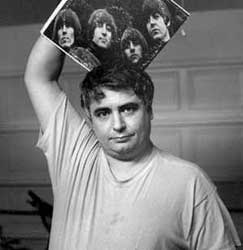 In aging footage of Daniel as a child & teen, he is revealed to have been, from the start, an artistic nerd collecting comic books & writing songs. Years later, we see him swollen & slightly disconnected from the world around him, drugged to control his bipolar condition. But he still writes songs, & if it's okay to be an aging punk, crazy or not, he's still one of the great ones. In aging footage of Daniel as a child & teen, he is revealed to have been, from the start, an artistic nerd collecting comic books & writing songs. Years later, we see him swollen & slightly disconnected from the world around him, drugged to control his bipolar condition. But he still writes songs, & if it's okay to be an aging punk, crazy or not, he's still one of the great ones.
In between, the strange & wonderful life of a young punk artist is documented. He didn't have a good singing voice. His musicality was at best adequate. And yet there is something in the primitive, sad, & cruel lyrics combined with a retro-British Invasion sweetness which reveals the obvious strangeness of his performances as naive genius.
Songs like "Dont Let The Sun Go Down on your Gree-Ee-Vance" are stunningly vital for all their amateurism. "Speedy Motor Cycle Of My Heart" has that trademark crackpot sweetness, a song that found its way onto a major television advertising campaign. "I am Walking the Cow" is a grin of oddity.
The wit of his lyrics, "Oh Lord I'm So Bored," "In my head there is a negative superman," "I had a flat tire down memory lane," often hint of his eccentricity transforming rapidly over time into madness & depression: "Got me a coffin shiny & black/ Goin' to the funeral & I'm never coming back."
Raw abstract weirdo music badly sung, Daniel comes off as a brain-damaged Bob Dylan, a genius diametrically opposed to slick professionalism. When he "catches on" among a small devoted audience in Austin, & even bamboozles his way onto MTV in an Austin underground music special, he stands out as the most memorable figure. We can share the delight that the goal of his manic moments -- to be a famous singer songwriter -- magically came true.
Embraced in New York by big fish in the small pond of the punk underground, it would seem that Daniel reached the "top of the world, ma," as his mom & dad never believed he could. But the tragedy of manic depression is that manias are not just moments of bizarre achievement, but of true insanity, & Daniel became truly convinced the Devil was abroad & after him.
At the height of his success in New York, he vanished into homelessness, striving really & truly turning the tables the devil. Daniel's position as an artist was already made. His juvenile cartoony artwork was becoming collectible. His lyrics were embraced as poems, his shouted barely talented singing coming down on the side of "yes" wherever the question was posed: "Is this cool or not? I can't tell."
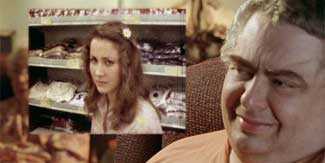 He had the same brilliance as some of the more primitive compositions of beatnicks, Warhol-circle surrealists or fluxus mail artists like Robert Bunny Johnson. But adding insanity to his resume, Daniel Johnston became a great mythic figure. He had the same brilliance as some of the more primitive compositions of beatnicks, Warhol-circle surrealists or fluxus mail artists like Robert Bunny Johnson. But adding insanity to his resume, Daniel Johnston became a great mythic figure.
Daniel's story is not yet finished, as he is always at risk of another long stint in the asylum, & the assistance in survival he needs & receives from his parents is fast approaching a time when their age renders them too fragile to provide it.
But for now, his story, like that of Brian Wilson, has a "happy" ending insofar as none of it quite killed him. He continues to this day to cope with his disabling bipolar condition, but he can still perform, & his raw crippled genius is still evident.
Jeff Feuerzeig's glorious documentary goes on the shelf alongside such moving documents as Crumb (1994), Rockets Redglare (2004), & How to Draw a Bunny (2002).
That Daniel has achieved an international audience says a lot good about humanity itself, which can here & there, now & then, turn away from the banality of canned pop & recognize rough greatness; & admire survival & achievement in the mentally ill rather than turn from it in horror or with despising take-your-meds-man jokes.
And it shows also that there's a little madness even in the sane, for Daniel Johnston speaks to the heart of those among us who have questioned the garish glare that poses as light, & are open to the dark. I love Daniel Johnston.
In the late '70s or early '80s, I forget exactly when, I contributed to a then-famous punk rock magazine Punk Lust edited & xerox-published by Wilum Hopfrog Pugmire, one of the world's great Lovecraftian authors besides a cool-ass punk bastard.
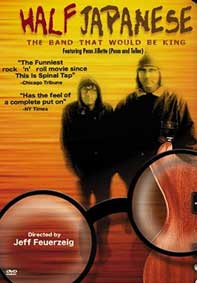 I wrote a review of fake band called Spike & the No-Talents, which consisted of two women, Spike (my alter ego, & The No Talents (my then-sweetheart Wendy's alter ego), & Wendy a first-rate illustrator provided a portrait of the two-person "band" in concert. I wrote a review of fake band called Spike & the No-Talents, which consisted of two women, Spike (my alter ego, & The No Talents (my then-sweetheart Wendy's alter ego), & Wendy a first-rate illustrator provided a portrait of the two-person "band" in concert.
"They" (according to the phony review) were opening for bigger unheard of punk bands around the Seattle area, promoting their self-titled EP, which had only four songs on it, including "Shaking Rocks Inside My Bongo" & "Stomping On This Stage."
It was a parody-review but naive young punk performers & venue-operators began contacting Punk Lust honestly wanting to contact Spike & the No-Talents to open for them. I wanted to perpetuate it as a hoax, but Wilum would never take advantage of fellow punks' sweet naivete, & informed each one by one that the review was a joke.
It is perhaps not just naivete that made such a silly excuse for a band sound authentic, as there was a satiric streak in punkdom, capable of embracing just such performers. And if they spat on you, it wasn't because they didn't like what you were doing.
The documentary film Half Japanese: The Band That Would Be King (1992) is a hoax only insofar as it makes it seem like Half Japanese were so influential that it just wouldn't be possible never to have heard of them if you ever had any connection anywhere in the world with the punk underground, as punk "began" in their bedroom & all true punkers who followed were imitating them.
Fact is, though, most of the punk underground missed them. That fact caused some critics to think this was a mocumentary & Half Japanese never existed at all, until Jeff Feuerzeig made them up a la Spinal Tap, getting some spectacularly subtle comedians to make them convincing.
But Half Japanese, unlike Spike & the No-Talents, are for real. They were founded circa 1976 by Jad & David Fair, who were already selling home-made tapes by 1977, & had their first "official" record release in 1980. Jad & David happen to be the cutest pair of nerds on earth, performing those first gigs onto tape & video tape in their bedroom, part hard-core, part folk, & all amateur-genius.
At first, & for a long time, they just made "fun noise" & were always tolerable mostly in bemused short doses, something they perfectly understood as they played fifteen minute gigs with a half-dozen or more different songs. In their embrace, aggressive talentlessness becomes genuinely a creative highwater mark of joyful raw energy.
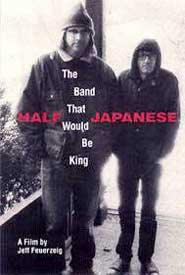 And if Jad & David seem unusually well-adjusted for Ohio misfits, it may be partly because their parents are so cute & supportive. And if Jad & David seem unusually well-adjusted for Ohio misfits, it may be partly because their parents are so cute & supportive.
The punk scene as I remember it was populated by kids living on the street or squatting in abandoned houses because their fathers beat the living hell out of them, & took their guitars & amps away from them for daring to make noise in the garage. But the Fair brothers' parents proudly proclaim their home to have been the birthplace of punk, a delusion, but what a sweet delusion for parents to have.
Saxophonist George Cartwright reveals his sense that he was just along for the ride, was around to keep the Fairs company, not otherwise necessary. But he understimates his contribution. Without his nearly melodic lines, Half Japanese would've been an all-percussion band since even the guitar banging was percussive. But with the sax, Half Japanese sometimes sounded like a real & true musically accomplished punk band rather than just some screamers & bangers in their bedroom.
For a while David left the band -- the documentary in no way hints at why -- & his absence was a disappointment thankfully repaired by his return to Jad's side. But his temporary absence did prove, for better or worse, that Jad was the genius on board. His twitchy geeky beauty is undeniable, the very epitome of chic nerdiness accompanied by the highest order of natural talent.
The band specialized in "love songs & monster songs" & their closest thing to an actual hit was "Thing with the Hook" about that perennial teen tale of the lover's lane killer with a hook for a hand. Lead singer Jad has a whiny-quirky voice which manages to convey an authentic beautifulness, & Jad turns a gawky jitteriness into a vital charisma so that it doesn't take a lot to recognize that he's frankly great.
Singing with non-ironic praise for Disneyland the song "Magic Kingdom," Jad conveys a childlike naivete that is a wonderful counterpoint to the usual punk cynicism. Many of the songs of Half Japanese were sweety-cutey. But then there are the monster songs, lest the band be mistaken for all sweetness & light.
The stories Penn Jillette of Penn & Teller tells about the band & their music as impacting his life are simply amazing, & I won't attempt to recap any of that here, but if you always felt (like me) that Penn with his dumbass magic act was half as entertaining as he seems to believe himself to be, well, as a racantour he may well be even better than he thinks he is.
Lovers of Velvet Underground will delight in the opinionated guest-drummer appearance of Maurine "Mo" Tucker. Those among us who've also become old ladies will be pleased to see Mo can still rock.
And it's especially lovely to see Half Japanese performing some of the songs of Daniel Johnston! Which reminds me to mention in passing that there exists a Daniel Johnston/Half Japanese collaboration album called It's Spooky long unobtainable but now available from Jagjaguwar. (Check out your favorite on-line music providers for lots of stuff by Daniel & the Fairs separately.)
By contrast, fan critics Gerard Cosloy & Byron Coley are the only annoying part of this otherwise perfect documentary. About two-thirds of their redundant foolishness should've been edited out in favor of another Half Japanese performance or two.
Coley in particular prattles on & on about how big labels are evil incarnate & how Half Japanese are the savior of mankind. At first this kind of loony dork-politic is campily amusing & great that an underground band has such champions. But it's given way too many minutes of play, until the ounce of truth is lost in the great whelter of narrowminded ignorance, ruining what would otherwise be the unadulterated joy of this film.
Fortunately the delusions of their most annoying advocates in no way afflict the good-hearted Fair brothers, who just want to play their music. They are glorious role models for all the untrained talents of the world, encouraging others to start doing it even if they don't yet know how to play even a single chord.
There are plenty of extras on the DVD release, the best add-on being the Half Japanese: Live in Hell (1985) This mini-concert has great power, with flames in the background & a couple dancing sisters in skeleton suits & rubber bats dangling through the set. Jad & the band come off as very solid rock performers, not just a garage band that a few people enjoyed.
copyright © by Paghat the Ratgirl
|
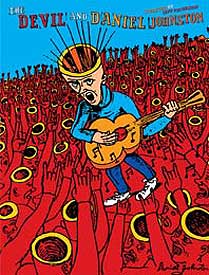
 In aging footage of Daniel as a child & teen, he is revealed to have been, from the start, an artistic nerd collecting comic books & writing songs. Years later, we see him swollen & slightly disconnected from the world around him, drugged to control his bipolar condition. But he still writes songs, & if it's okay to be an aging punk, crazy or not, he's still one of the great ones.
In aging footage of Daniel as a child & teen, he is revealed to have been, from the start, an artistic nerd collecting comic books & writing songs. Years later, we see him swollen & slightly disconnected from the world around him, drugged to control his bipolar condition. But he still writes songs, & if it's okay to be an aging punk, crazy or not, he's still one of the great ones. He had the same brilliance as some of the more primitive compositions of beatnicks, Warhol-circle surrealists or fluxus mail artists like Robert Bunny Johnson. But adding insanity to his resume, Daniel Johnston became a great mythic figure.
He had the same brilliance as some of the more primitive compositions of beatnicks, Warhol-circle surrealists or fluxus mail artists like Robert Bunny Johnson. But adding insanity to his resume, Daniel Johnston became a great mythic figure. I wrote a review of fake band called Spike & the No-Talents, which consisted of two women, Spike (my alter ego, & The No Talents (my then-sweetheart Wendy's alter ego), & Wendy a first-rate illustrator provided a portrait of the two-person "band" in concert.
I wrote a review of fake band called Spike & the No-Talents, which consisted of two women, Spike (my alter ego, & The No Talents (my then-sweetheart Wendy's alter ego), & Wendy a first-rate illustrator provided a portrait of the two-person "band" in concert. And if Jad & David seem unusually well-adjusted for Ohio misfits, it may be partly because their parents are so cute & supportive.
And if Jad & David seem unusually well-adjusted for Ohio misfits, it may be partly because their parents are so cute & supportive.